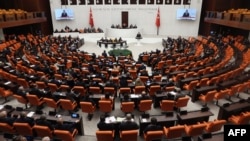Turkey’s parliament erupted in controversy this week when the nation’s only Assyrian lawmaker delivered a Christmas message in his native Syriac language, offending other legislators who believe that only Turkish should be spoken in the national assembly.
"Starting with our Greek, Armenian and Assyrian citizens living in Turkey, I congratulate all Christians on Christmas," said George Aslan, a member of the pro-Kurdish Peoples’ Equality and Democracy Party (DEM Party), during a budget debate Monday. "I hope the new year brings love and peace to our country and the whole world.
"I would like to deliver the same message on Christmas in Syriac for the Assyrian people who don’t know Turkish," added Aslan, who continued his speech in Syriac.
Several lawmakers from the nationalist, center-right Good Party (IYI Party) objected to Aslan speaking from the podium in a language other than Turkish.
Official language
Assyrians are a Christian minority in the Middle East, and their numbers are shrinking in Turkey, Syria and Iraq, where they live. Their history dates to ancient Mesopotamia. The Syriac language is a Semitic language and is distinct from Arabic.
Aslan told VOA that he approached Musavat Dervisoglu, deputy chairman of the IYI Party’s parliamentary group, outside the parliament hall to ask why IYI lawmakers objected to his speaking in Syriac.
"We did not bring this language from another planet. It is a language spoken in these lands for centuries. Why do you object because I said two words in my native language? What is your problem?’ I said," Aslan told VOA.
He said Dervisoglu replied that he is "not against the Syriac language, but the official language in the parliament is Turkish."
Aslan says he will continue to speak Syriac whenever appropriate.
"Everyone will get used to it. This is the language of our people," Aslan added.
However, IYI Party lawmakers insist that speeches in the parliament must be delivered in Turkish.
"Turkish Parliament is one of the foremost constitutional institutions [in the country]. The provision in [Turkey’s] constitution that ‘Turkey’s official language is Turkish’ also applies in the Parliament," said Lutfu Turkkan, one of the IYI Party lawmakers who reacted to Aslan’s speech.
Turkkan also told VOA that lawmakers are bound by an oath of allegiance to the constitution.
"I didn’t realize that he was speaking Syriac or Kurdish anyway. I am not fluent in those languages, nor do I know them. However, no matter who he is, anyone at the podium of our great veteran assembly must deliver his speech in Turkish," Turkkan added.
'We are in the 21st century’
According to Evgin Turker, head of the Federation of the Syriac Associations in Turkey, some people have no tolerance for other languages, even on the 100th anniversary of the Turkish Republic.
"We are in the 21st century. A member of parliament is celebrating Christmas by speaking to his people in his native language, and they are going crazy," Turker told VOA.
"Regardless of the language, everyone should have the freedom to express themselves in their native language, and they should have schools," Turker added.
In October, President Recep Tayyip Erdogan inaugurated a Syriac Orthodox Church, the first new church in modern Turkey’s 100-year history.
While the Lausanne Treaty, the founding document of the Turkish Republic, provides the legal basis for non-Muslim minorities — including Greeks, Armenians and Jewish people — to open their schools in the country, Assyrians do not have schools where the Syriac language is taught. There is one Assyrian kindergarten that opened in Istanbul in 2014.
Previous debates
Aslan’s Syriac remarks were recorded in the parliamentary minutes as an ellipsis, with a footnote stating, "Non-Turkish words were used by the speaker in these sections."
This has been a regular practice of the parliamentary minutes’ transcribers, who apply the same practice to every non-Turkish language, including Kurdish, English and French.
However, according to the independent fact-checking organization Teyit, Kurdish speech was recorded in the parliamentary minutes as an "unknown language" in the 1990s and early 2000s.
Kurdish was banned in Turkey from the time of a 1980 military coup until January 1991.
In November 1991, Leyla Zana, a prominent Kurdish politician elected as a parliamentarian, caused an uproar by speaking in Kurdish during her oath ceremony. Her speech appeared as "unknown language" in the parliamentary minutes.
Zana did the same thing in 2015 when she was elected to the parliament for the second time. Her oath was ruled invalid.
On December 12, Tuncer Bakirhan, co-chair of the DEM Party, began his speech in Kurdish, saying, "Kurds, whose existence, language and fundamental rights are ignored and whose citizenship is annotated, exist and are everywhere."
Parliament Speaker Numan Kurtulmus requested that Bakirhan speak in Turkish. Bakirhan’s Kurdish speech appeared as an ellipsis with the same footnote as Aslan’s speech.
Restrictions on the Kurdish language were relatively eased during Turkey’s peace process with the Kurdistan Workers Party, with many issues debated, including primary education, in Kurdish.




